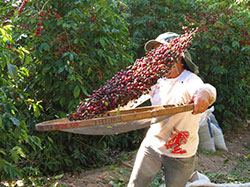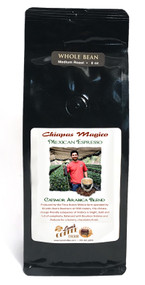Chiapas Magico Espresso - for Restaurants and Cafés
From the estate of Finca Nuevo México operated by Ricardo Ibarra Baumann we have sourced a new Catimor Arabica varietal. Pairs wonderfully with Southwestern cuisine. Catimor is one of our favorite bases for espresso, and it has the added plus of being climate-change friendly. This espresso is so rich and satisfying a number of customers have told us it is their new favorite coffee. It brews well as a drip coffee, too.
Our newest espresso was created as a commission for a Mexican cuisine restaurant in the Southwest. The Catimor base is sharp, has high body and a gentle acidity, with notes of butterscotch, green apple and tangerine. We have balanced this with lower-acid beans that have a smooth, buttery, chocolatey finish. The result is a delightfully complex cup with a compelling taste profile that makes it hard not to call for second cup, or third...
This is a rich, satisfying espresso that has high appeal for every palate.
Our name for this espresso reflects the wonderful practice in Mexico of preserving the heritage of unique cultural treasures and regions dubbed by the government as Pueblos Magicos. Coffee cultivation in Mexico has shaped a good deal of its agricultural and gastronomical history since the 1700's. In the early 1900s, land reform split the plantations into smaller land holdings operated by individual farmers. Mexico is one of the top 10 exporters of coffee in the world.
We ship this coffee in whole bean only, in multiples of 17 pounds that ship economically by UPSP or UPS Ground. Roasted to order, please allow 2-3 business days for production.
Customer Reviews
Latest Coffee Addition

Colombian Castillo Heritage Arabica!
Coffee from the days when Colombian coffee defined American consumer tastes. Warm, rich, delicious! Read more here!
 Loading... Please wait...
Loading... Please wait...












